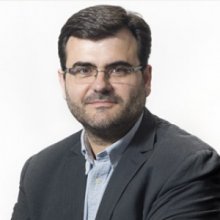Images
Participants

Contact

Yesterday, the coordinator of IRB Barcelona’s Oncology Programme participated in the conference series Ciencia After Work a la Pedrera in a session entitled Càncer de colon, què hi ha de nou? (Colon cancer: what’s the latest?), with Dr. Antoni Castells, from the Hospital Clínic, and Dr. Elena Élez, from the Hospital Vall d’Hebrón.
Yesterday evening, the Auditorium of “La Pedrera” hosted a new session of the “Ciencia After Work a la Pedrera” entitled “Càncer de colon, què hi ha de nou?” (Colon cancer: what’s the latest?). Antoni Castells, Medical Director of the Hospital Clínic de Barcelona, Elena Élez, Associate Specialist with the Medical Oncology Service at the Hospital Universitari Vall d’Hebrón, and Eduard Batlle, Head of the Colorectal Cancer Lab at IRB Barcelona and coordinator of the Oncology Programme headed the scientific conversation, which was chaired by Josep Corbella, a journalist specialised in science and health.
The event consisted of three parts, namely prevention, treatment and research into colorectal cancer, led by each of the speakers. Dr. Antoni Castells was the first to speak, focussing on prevention, "Colon cancer is the most widespread type of cancer, but it is the one that can be best prevented. Approximately 80% of cases are sporadic and only 20% are attributable to hereditary causes.” He went on to say that this kind of cancer can be detected early through screening for precursor lesions (polyps) and associated genes. He also stressed the importance of losing fear and doing away with taboos associated with this type of cancer. Dr. Élez focused on treatment and added that early detection allows 80% of colorectal cancers to be cured and that drugs are breakthroughs that improve treatment options, allowing individualised regimes for each patient. "Not all tumours are the same. The extraordinary development of sequencing techniques and genome analysis has revealed that each cancer is characterised by a particular set of mutations and should therefore be considered a different disease."
Dr. Batlle ended this part of the conference talking about research and stated that more than 20 altered genes are associated with colon cancer and their combination makes each patient distinct. In addition, he said that there are two fields of research that are evolving rapidly and now represent the most promising options in the fight against cancer. On the one hand, he explained that they are getting closer to deciphering the mechanisms responsible for metastasis. It is likely that the coming years will see the development of the first drug to stop this process. "90% of deaths are from metastases, therefore research centres on new drugs to block this phenomenon," he said. The second field mentioned was immunotherapy. Studies in patients with skin cancer (melanoma) and lung cancer have shown that the immune system exerts powerful antitumor activity. The researcher acknowledged that one of the great hopes is for immunotherapy to unleash the potential of the immune system to recognize and attack specific tumour cells and that this strategy has considerable advantages over other therapies.
Finally, before the end of the event, a question and answer session was opened to the audience. Importance was given to a balanced diet and exercise and the effect of having a disease like obesity on the development of cancer. The speakers highlighted that they were working to speed up the diagnosis process.
Colon cancer: what’s the latest?
One in twenty people will develop colon cancer during their lives. Colon cancer is the cancer with the highest incidence in Spain and the third most common worldwide. Thanks to advances in prevention, early diagnosis, and new treatments, death from this disease is falling yearly. In this “Ciència After Work” session, scientists working at the forefront of research into colon cancer spoke of the progress they are making in the lab, and clinical specialists described the risk factors and symptoms of colon cancer, highlighting the importance of prevention and early diagnosis. The speakers also discussed how discoveries made in the laboratory can contribute to improving medical treatments. The talk ended with a question and answer session involving the audience.
This event was organized by the Catalunya-La Pedrera Foundation, the Olga Torres Foundation, the Institute for Research in Biomedicine (IRB Barcelona) and the Barcelona Institute of Science and Technology.
Source: Catalunya- La Pedrera Foundation
About IRB Barcelona
The Institute for Research in Biomedicine (IRB Barcelona) pursues a society free of disease. To this end, it conducts multidisciplinary research of excellence to cure cancer and other diseases linked to ageing. It establishes technology transfer agreements with the pharmaceutical industry and major hospitals to bring research results closer to society, and organises a range of science outreach activities to engage the public in an open dialogue. IRB Barcelona is an international centre that hosts 400 researchers and more than 30 nationalities. Recognised as a Severo Ochoa Centre of Excellence since 2011, IRB Barcelona is a CERCA centre and member of the Barcelona Institute of Science and Technology (BIST).




